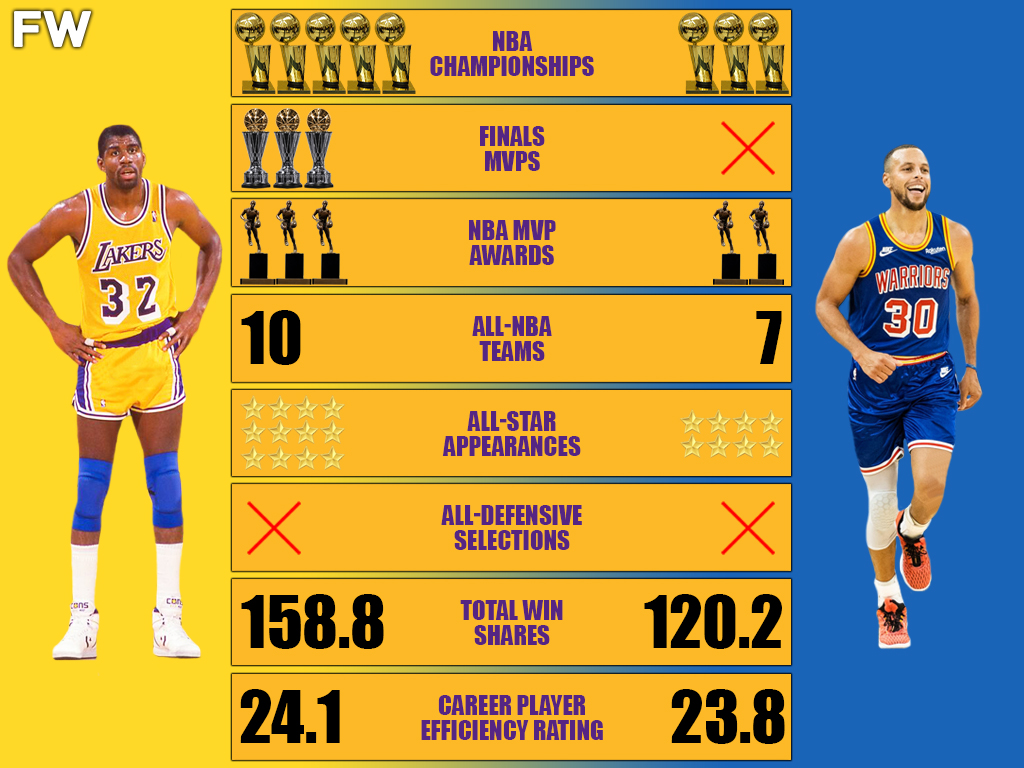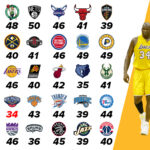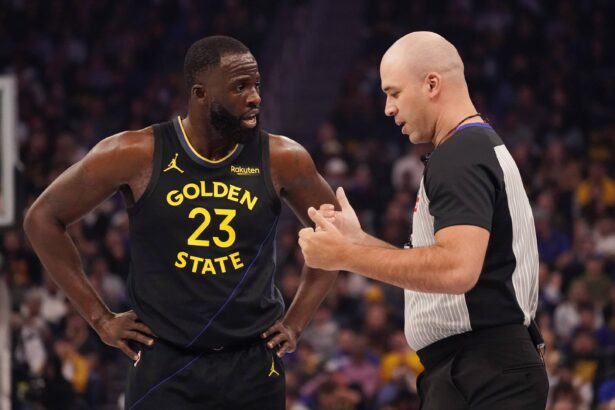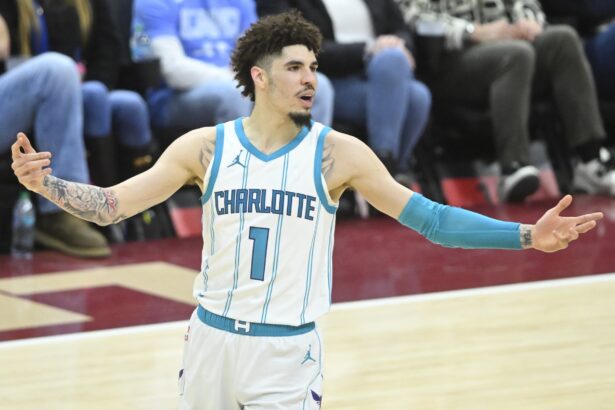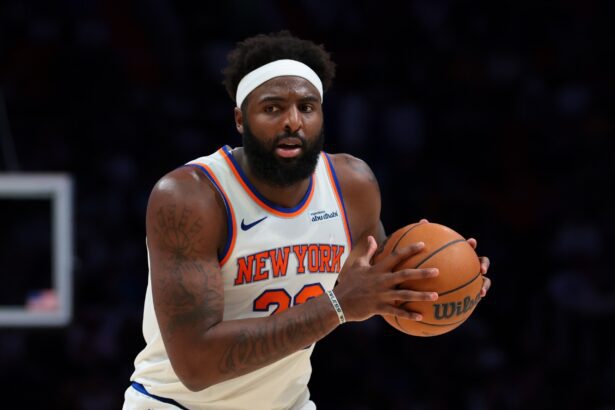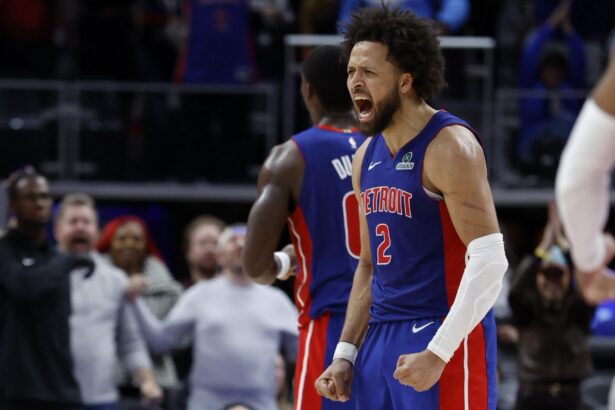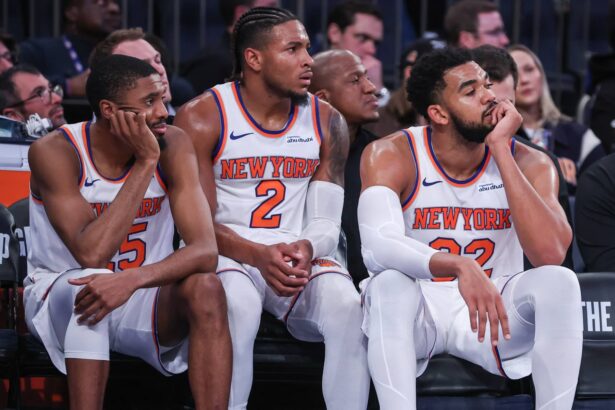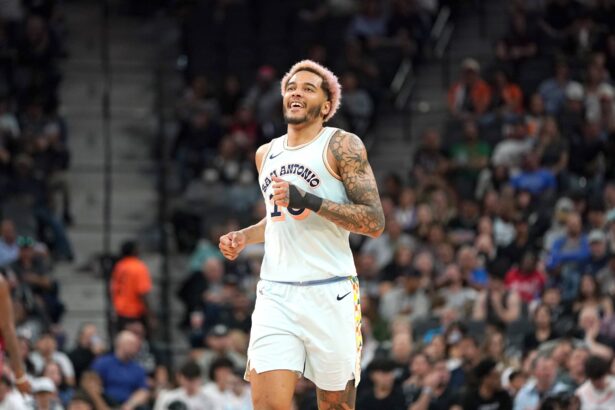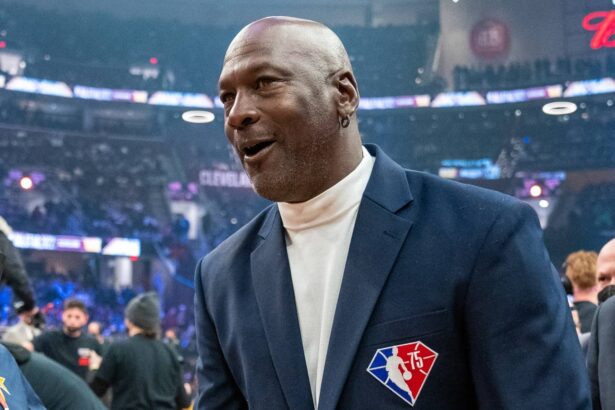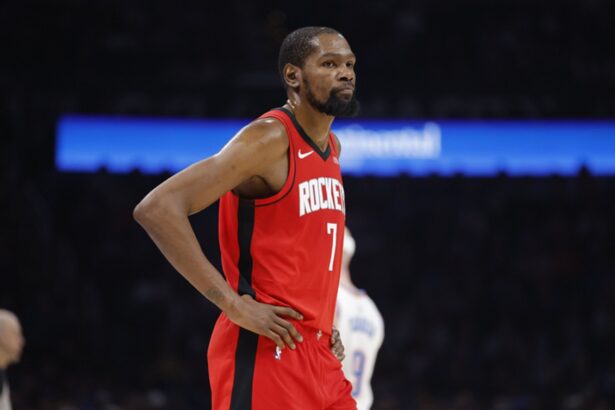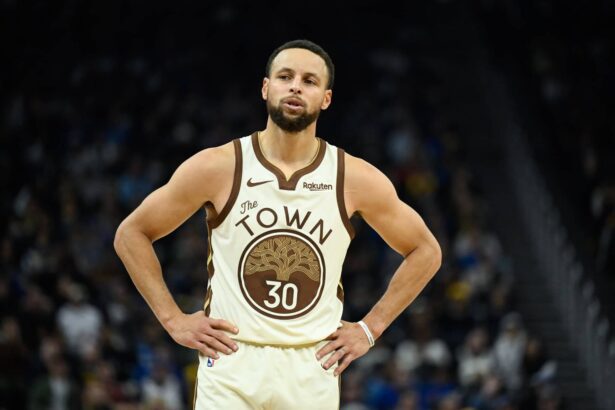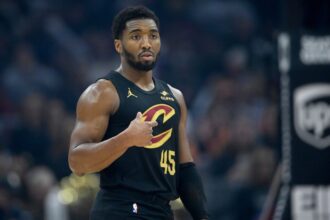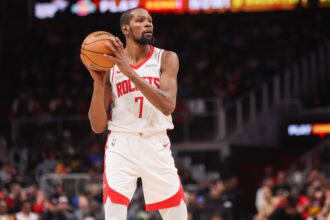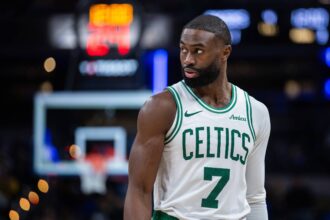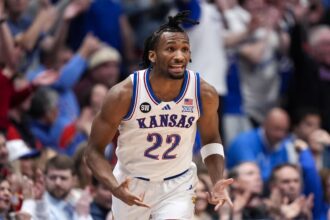Magic Johnson entered a nearly bankrupt league in 1979, confined to predictable half-court sets ending in a low post attempt or a mid-range jumper. Magic pumped life into the NBA, pushing his teammates to get out on the break and creating the Showtime Lakers. The Purple and Gold won the championship in Johnson’s rookie year, ushering in a new and exciting era for the game.
- NBA Championships
- Finals MVP Awards
- NBA MVP Awards
- All-NBA Teams
- All-Star Selections
- All-Defensive Teams
- Total Win Shares
- Career Player Efficiency Rating (PER)
- Final Score
- Magic Johnson vs. Stephen Curry 7-0
- Next
- Magic Johnsons’ Career Record vs. NBA Legends: Only Michael Jordan And Scottie Pippen Won Their Head-To-Head Matchups Against Magic
- Stephen Curry vs. Allen Iverson Comparison: Two Unbelievable Superstars That Changed The Game
- Kobe Bryant vs. Tim Duncan Comparison: Who Had The Better Career?
- Larry Bird vs. Kevin Durant Career Comparison: They Are So Close, But Bird Still Flies High
- Shaquille O’Neal vs. Kareem Abdul-Jabbar Comparison: Who Is The Greater Center?
37 years later, in 2016, Stephen Curry revolutionized the NBA again, helping the Warriors break the 1996 Chicago Bulls’ 72 game win season with a 73-9 record. At the end of the year, he was the unanimous MVP Award winner while joining the nearly impossible 50/40/90 club. Curry broke the rules of the NBA, changing what we thought was possible by shooting 44.6% off 565 attempts from 25 to 29 feet and 57.7% off 26 shots from 30 to 34 feet. Steph dragged opposing defenders away from the key, opening enough space at the elbows for his teammates to park a 79 Cadillac, allowing them to hit easy unmolested shots on their way to the finals.
Magic Johnson played 13 NBA seasons, and Stephen Curry is days away from finishing his 13th season in the league. Both men are all-time great point guards who redefined what was possible on a basketball court. It’s fair to ask: How does Curry’s career stack up with Magic Johnson’s?
Below we’ll compare Stephen Curry to Magic Johnson.
NBA Championships
Magic Johnson: 5 (1980, 1982, 1985, 1987, 1988)
Finals Record: 5-4
Stephen Curry: 3 (2015, 2017, 2018)
Finals Record: 3-2
Magic Johnson won his first title during his rookie campaign in 1980. He averaged 18.3 PPG during his inaugural playoff run, along with postseason highs of 9.4 APG and 3.1 SPG. The Lakers breezed by the Phoenix Suns and Seattle Supersonics, winning both series 4-1. They went up 3-2 against Julius Erving and the Philadelphia 76ers in the Finals, but Lakers center Kareem Abdul Jabbar sprained his ankle towards the end of the fifth game. Magic iconically suited up at the 5 during game six, dropping 42 points and 15 rebounds as the Purple and Gold won 123-107 to hang a banner.
Two years later, Magic Johnson and the Lakers won their second championship of the 80s. Johnson averaged a near triple-double throughout the 1982 playoffs, averaging 17.4 PPG, 11.3 RPG, and 9.3 APG, along with a postseason high of 2.9 steals per contest. The Lakers finished 12-2 in the playoffs, beating the 76ers for the second time in three years, 4-2.
In 1985 Magic led the Lakers to the top of the mountain behind one of the greatest postseason performances of all time. Johnson averaged a whopping 15.2 assists per game, setting up teammates Kareem Abdul-Jabbar, James Worthy, Byron Scott, and Bob McAdoo with flawless dimes in transition, pinpoint swing passes behind the arc, and precision bounce passes off cuts. The Lakers stormed through the Western Conference, going 11-2, and took down Larry Bird and the Boston Celtics four games to two in the finals.
Magic won his fourth title in 1987, averaging 21.8 PPG, 7.7 RPG, and 12.2 APG throughout the playoffs. The Lakers sauntered through the Western Conference, sweeping the Nuggets in three games, beating the Warriors in five, and taking down the Supersonics in four easy contests. The Purple and Gold reached the finals, a well-oiled machine with Magic running the offense from the driver’s seat. James Worthy and Kareem provided inside scoring, Byron Scott provided scoring from deep, and Michael Cooper, A. C. Green, and Kurt Rambis provided defense and rebounding. The Lakers faced the Celtics in the finals and won 4 to 2.
Magic won his only back-to-back titles the following year in 1988, averaging 19.9 PPG, 5.9 RPG, and 12.6 APG throughout the postseason. The Lakers won three seven-game series in a row, beating the Jazz in the Western Conference Semis, the Mavs in the Western Conference Finals, and the Pistons in the Finals.
Stephen Curry won his first title during his sixth season. He averaged 28.3 PPG, 5.0 RPG, and 6.4 APG while shooting 42.2% from deep off 11.0 attempts per game throughout the postseason. Stephen Curry, Klay Thompson, Draymond Green, Harrison Barnes, and Andre Iguodala stormed through the postseason at 16-5, eventually beating an excellent Cavs team featuring LeBron James and Kyrie Irving in the Finals.
Curry and the Warriors won the title in 2017 behind one of the greatest collections of talent in NBA history. Kevin Durant led the Warriors throughout the postseason with 28.5 PPG, 7.9 RPG, and 4.3 APG while shooting 44.2% from deep. Curry was a close second at 28.1 PPG, 4.9 RPG, 6.7 APG, and 41.9 3P%. Klay Thompson, Draymond Green, and Andre Iguodala also pitched in during the postseason as Golden State went 16-1, beating the Cavs in the Finals 4-1.
The Warriors’ core of Stephen Curry, Kevin Durant, Klay Thompson, Draymond Green, and Andre Iguodala won back-to-back titles the following year in 2018. Stephen Curry continued to blast the league, averaging 25.5 PPG, 6.1 RPG, and 5.4 APG while connecting on 39.5% of his three attempts during the postseason. The Warriors were rarely challenged during their 2018 playoff run, finishing 16-5 and sweeping the Cavs in the Finals.
Advantage: Magic Johnson
Finals MVP Awards
Magic Johnson: 3 (1980, 1982, 1987)
Stephen Curry: 0
Magic Johnson won his first Finals MVP as a rookie during the 1980 postseason. Kareem Abdul-Jabbar had the award seemingly locked up, averaging a series-high 33.4 PPG and 13.6 RPG, but after he suffered a sprained ankle in game 5, Magic did the unbelievable. He suited up at the center position for the Lakers. Johnson brought home the title with one of the best Finals performances of all time, averaging 42 points and 15 rebounds while containing superstar Julius Erving.
During the 1982 Finals, Magic Johnson won the Finals MVP behind a near triple-double performance, averaging 16.2 PPG, 10.8 APG, and 8.0 RPG. Magic was the clear leader of the Lakers, helping push the pace and giving the 76ers fits throughout the Finals, slipping the ball through the tiniest of cracks, propelling his teammates to easy shots at their preferred spots on the court.
The 1987 Finals saw Magic Johnson up his scoring output, pouring in 26.2 PPG along with 8.0 RPG and 13.0 APG throughout six challenging games against the Celtics. Magic dominated the Finals, outplaying rival Larry Bird, amassing some of the most impressive offensive Finals metrics the league had ever seen, including a ridiculous 132 Offensive Rating, a 46.5 Assist Percentage, and a 50% mark from deep.
One of the major knocks against Stephen Curry is that he’s never been the most valuable player during the Finals for the Golden State Warriors. Throughout the Warriors’ first title in 2015, Andre Iguodala won the Finals MVP Award. He averaged 16.3 PPG, 5.8 RPG, and 4.0 APG while recording an excellent 100 Defensive Rating as he helped hold LeBron James to 39.8% from the field. Kevin Durant won back-to-back Finals MVPs in 2017 and 2018, dominating the Cavs as the best player on the court.
Advantage: Magic Johnson
NBA MVP Awards
Magic Johnson: 3 (1987, 1989, 1990)
Stephen Curry: 2 (2015, 2016)
Magic Johnson was at the height of his powers from 1987 through 1990, winning three MVP awards during a four-year span.
Here’s a breakdown of Magic’s numbers from the 1986-87 season through 1989-90:
He averaged 22.1 PPG, 12.1 APG, 6.8 RPG, and 1.7 SPG across 306 games.
Magic had 51 triple-doubles, by far the best mark in the league.
He had a 47.2 Assist Percentage with only a 24.4 Usage% that would rank 71st in 2021, on par with Portland’s Anfernee Simons.
Magic Johnson’s in-his-prime dominance is like nothing the league has ever seen.
Imagine what type of numbers Magic could have put up with Luka Doncic’s 36.1% Usage Rate this season. Johnson could have easily averaged 29.0 PPG, 16.0 APG, and 10.0 RPG, making Russell Westbrook’s triple-double seasons look like child’s play.
Stephen Curry’s four-year peak between 2015-16 through 2018-19 is on par with Magic’s run from 1987 to 1990. Curry won two MVP Awards, put up the best single-season in NBA history, and broke the rules of the league.
Have a look at Steph’s numbers from 2015-16 through 2018-19:
He averaged 27.3 PPG, 5.1 RPG, 6.2 APG, and 1.7 SPG across 278 games.
Steph made 1,292 three-pointers, by far the most throughout a four-year stretch in league history, shooting 43.3% from deep.
Curry had a 65.1 True Shooting Percentage, which is ridiculous compared with some of the greatest players. Michael Jordan (The Goat) had a 58.8 TS% during his peak from 1989-90 through 1992-93, and Ray Allen (The Best Pure Shooter Ever) had a 57.1 TS% throughout his prime from 2003-04 through 2007-08.
Stephen Curry’s shooting ability from out to 34 feet is the most impressive we’ve ever seen. Steph changed the way the game is played, and although he isn’t the all-around offensive force of Magic Johnson, he’s a solid passer and playmaker in his own right.
Advantage: Magic Johnson
All-NBA Teams
Magic Johnson: 10 (9 First Team, 1 Second Team)
Stephen Curry: 7 (4 First Team, 2 Second Team, 1 Third Team)
Magic Johnson was named NBA First Team nine seasons in a row from 1983 through 1991 as the clear-cut top point guard in the league. During that span, he averaged 20.0 PPG, 12.2 APG, 6.9 RPG, 1.7 APG, and 0.4 BPG while shooting 51.8% from the field. Magic led the Lakers to the postseason every season that he was named to the First Team, making the Finals six times and hanging three banners.
Stephen Curry was named All-NBA First team in 2015, 2016, 2019, and 2021. He made All-NBA Second Team in 2014 and 2017, and Steph was named All-NBA Third Team in 2018. Injuries derailed Stephen Curry from making All-NBA First Team in 2017, and in 2018 he saw his touches decrease with Kevin Durant on the team. In 2020 Curry played in only five contests with a broken hand before reclaiming his spot as one of the NBA’s top two guards in 2021.
Advantage: Magic Johnson
All-Star Selections
Magic Johnson: 12 All-Star Appearances, 2 All-Star Game MVP Awards
Stephen Curry: 8 All-Star Appearances, 1 All-Star Game MVP Award
Magic Johnson was selected to the All-Star team during his rookie season. He missed more than half his sophomore campaign with a knee injury, canceling out any chance of an All-Star berth. From 1982 to 1991, Johnson was an All-Star mainstay, making the team 11 seasons in a row before he was forced to take four years off with HIV. Magic won two All-Star Game MVP Awards in 1990 and 1992, but his 1984 exhibition is probably his best-remembered performance, as fans rejoiced watching him dish out 22 assists to his Western Conference teammates.
Stephen Curry, 21, entered the league as a skinny kid who needed a few years to get his legs under him. It took Curry five seasons to make his first All-Star team in 2014. Then he was selected to the team for six consecutive seasons before a hand injury disrupted his run in 2020. Curry got back on track in 2021 and 2022. Curry has one All-Star Game MVP to his name from this season. Steph put on the most spectacular shooting display in the NBA mid-season classic’s history, connecting on 16 shots from deep on his way to 50 points.
Advantage: Magic Johnson
All-Defensive Teams
Magic Johnson: 0
Stephen Curry: 0
Magic Johnson was never known as a lockdown defender. Still, he led the league in steals two seasons in a row, 1981 (3.4 SPG) and 1982 (2.7 SPG). Johnson has a nose for the ball and was a solid disruptor on the less fun end. Magic was also an excellent rebounder. He’s ranked fourth all-time among point guards in total rebounds behind only Jason Kidd, Oscar Robertson, and Russell Westbrook at 6,376 rebounds throughout his career. Magic might not have ever been named to an All-Defensive Team, but he’s 70th in league history in Defensive Win Shares at 45.23, proving that he was more than just an offensive-minded guard.
Stephen Curry, 6-2, 185 pounds, doesn’t have the size to be a true ballhawk. Still, he’s no slouch on the less fun end. He led the league in steals during his 2015-16 MVP season with 2.1 thefts nightly. Curry has also landed inside the NBA’s top-50 in deflections throughout his career as a quick-handed pest on defense.
Advantage: None
Total Win Shares
Magic Johnson: 158.8 WS
Stephen Curry: 120.2 WS
Win Shares is a statistic that tries to allocate a team’s wins for each player on the roster. For example, Kareem Abdul-Jabbar owns the single-season record for Win Shares with 25.4 during 1971-72 on a Milwaukee Bucks team that won 63 games. Kareem is credited with 25.4 of those wins.
Magic Johnson lands 24th all-time in Win Shares ahead of Kevin Durant, Paul Pierce, and James Harden. Magic was the leading member of the 80s Lakers, the winningest team of the decade, which helped him build his WS. Magic also compiled impressive career averages of 19.5 PPG, 7.2 RPG, 11.2 APG, 1.9 SPG, and 0.4 BPG. Unfortunately, Johnson’s court time was cut short because of his battle with HIV from 1991 through 1995 before he returned for one season in 1995. During the three years prior to Magic’s abrupt retirement, he averaged 16.0 Win Shares per season (1989-90 through 1990-91), making it easy to see the Hall-of-Fame point guard landing inside the top-10 in WS if he’d been able to continue playing.
Stephen Curry is 50th all-time in Win Shares at 120.4. Like all statistics, WS is imperfect and doesn’t account enough for Curry’s best-ever three-point shooting. James Harden is well above Curry in Win Shares at 149.65 despite never winning a title or seeing the same type of overall success because he dominates in assists per game and rebounds per game. Many of the all-encompassing stats can’t accurately measure Curry’s game and impact.
Advantage: Magic Johnson
Career Player Efficiency Rating (PER)
Magic Johnson: 24.1 PER
Stephen Curry: 23.8 PER
Player Efficiency Rating, better known as PER, is a statistic created by John Hollinger that’s goal is to give each NBA player a comprehensive rating. Hollinger’s PER metric is unique because it combines a player’s positive and negative contributions on the court.
For comparison’s sake, Michael Jordan is first all-time in PER at 27.91, Karl-Anthony Towns is 10th all-time with a 24.80 PER, and Stephen Curry lands 20th all-time at 23.84 PER.
Magic Johnson is 18th all-time in PER. Johnson has a career 52.0% mark from the field, which bolsters his efficiency, and he dished out 11.0 Assists to only 3.9 TOV per game, giving him an excellent 2.89 assist-to-turnover ratio, a mark that is nearly identical to Steve Nash. Johnson joins Chris Paul as the two most efficient high-volume point guards to suit up.
Stephen Curry lands two spots under Magic in PER, coming in 20th all-time with a 23.8 mark. Curry’s incredible shooting percentages have helped him climb the rankings. Steph is fifth in NBA history in true shooting percentage with a 62.4% clip, trailing four centers, Rudy Gobert, DeAndre Jordan, Cedric Maxwell, and Tyson Chandler, as the only point guard in the top-15.
Advantage: Magic Johnson
Final Score
Magic Johnson vs. Stephen Curry 7-0
Magic Johnson beats this decade’s premier point guard, Stephen Curry, 7-0, dominating him in our career comparison. Magic was a true force of nature, winning 5 titles, 3 Finals MVP Awards, and 3 regular season MVPs throughout his career. Magic’s complete beat down over Steph in every major category speaks to how talented the Lakers point guard was. Even though the Purple and Gold legend has been in the news lately for his front office gaffs in LA, NBA fans can’t forget his true greatness.

